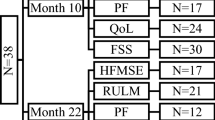Abstract
The aim of this study was to evaluate respiratory muscle strength, respiratory functions and quality of life in multiple sclerosis (MS) patients and compare the results with the healthy volunteers. The study included a group of 24 patients diagnosed with MS (16 women, 8 men) with an EDSS score of ≤ 5, who were without clinical respiratory impairment. MS patients were compared with the healthy volunteer group (16 women, 8 men). Respiratory muscle strength and respiratory functions were evaluated with specific devices. Maximal inspiratory pressure (MIP) and maximal expiratory pressure (MEP) parameters were measured for the muscle strength. Forced vital capacity (FVC), forced expiratory volume (FEV1), FEV1/FVC, peak expiratory flow, and forced expiratory flow (FEF25−75) parameters were measured for the respiratory functions. Questionnaire SF-36 was applied to evaluate health-related quality of life. A total of 24 MS patients’ respiratory function test results were compared with healthy volunteers and significant changes were found at MIP, MEP, and FEV1 parameters. Quality of life was compared between the groups and there was a significant difference in parameters related with physical performance and physical-health-related role limitations. There is an early involvement of the respiratory muscles in patients with MS, yet clinical symptoms appear in later stages. Respiratory functions should be evaluated at the earlier stage of the disease so that rehabilitation can be planned in order to reduce respiratory complications and improve the quality of life in patients.
Similar content being viewed by others
References
Adams RD, Victor M (2001) Principles of neurology. 7th edition, Mc Graw-Hill, New York, pp. 954–979
Fry DK, Pfalzer LA, Chokshi AR, Wagner MT, Jackson ES (2007) Randomized control trial of effects of a 10-week inspiratory muscle training program on measures of pulmonary function in persons with Multiple Sclerosis. J Neurol Phys Ther 31:162–172
Gosselink R, Kovacs L, Ketelaer P, Carton H, Decramer M (2000) Respiratory muscle weakness and respiratory muscle training in severely disabled Multiple Sclerosis patients. Arch Phys Med Rehabil 81:747–751
Grasso MG, Lubich S, Guidi L, Rinnenburger D, Paolucci S (2000) Cerebellar deficit and respiratory impairment: a strong association in Multiple Sclerosis? Acta Neurol Scand 101:98–103
Ward NS, Hill NS (2001) Pulmonary function testing in neuromuscular disease. Clin Chest Med 22:769–781
Tedeholm H, Skoog B, Lisovskaja V, Runmarker B, Nerman O, Andersen O(2015) The outcome spectrum of multiple sclerosis: disability, mortality, and a cluster of predictors from onset. J Neurol 262:1148–1163
Cutter GR, Zimmerman J, Salter AR,et all (2015) Causes of death among persons with multiple sclerosis. Mult Scler Relat Disord 4:484–490
Rabinstein AA (2016) Noninvasive ventilation for neuromuscular respiratory failure: when to use and when to avoid. Curr Opin Crit Care 22:94–99
Howard RS, Wiles CM, Hirsch NP, Loh L, Spencer GT, Newsom-Davis J (1992) Respiratory involvement in Multiple Sclerosis. Brain 115:479–494
Wens I, Eijnde BO, Hansen D (2016) Muscular, cardiac, ventilatory and metabolic dysfunction in patients with multiple sclerosis: implications for screening, clinical care and endurance and resistance exercise therapy, a scoping review. J Neurol Sci 367:107–121
Tzelepis GE, McCool FD.(2015) Respiratory dysfunction in multiple sclerosis.RespirMed.;109:671–679
Altintas A, Demir T, Ikitimur HD, Yildirim N (2007) Pulmonary function in multiple sclerosis without any respiratory complaints. Clin Neurol Neurosurg 109:242–246
Kartaloğlu Z, Okutan O (2012) Current approach to respiratory problems in neuromuscular disease. Tuberk Toraks 60:279–290
Buyse B, Demedts M, Meekers J, Vandegaer L, Rochette F, Kerkhofs L (1997) Respiratory dysfunction in Multiple Sclerosis: a prospective analysis of 60 patients. Eur Respir J 10:139–145
Klefbeck B, Hamrah Nedjad J (2003) Effect of inspiratory muscle training in patients with Multiple Sclerosis. Arch Phys Med Rehabil 84:994–999
Smeltzer SC, Skurni ck JH, Troiano R, Cook SD, Duran W, Lavietes MH (1992) Respiratory function in Multiple Sclerosis. Utility of clinical assessment of respiratory muscle function. Chest 101:479–484
Tantucci C, Massucci M, Piperno R, Betti L, Grassi V, Sorbini CA (1994) Control of breathing and respiratory muscle strength in patients with Multiple Sclerosis. Chest 105:1163–1170
Bosnak M, Gündüz A. Nazlıel B, İrgeç C (2012) Comparison of functional exercise capacity, pulmonary function and respiratory muscle strength in patients with multiple sclerosis with different disability levels and healthy controls. J Rehabil Med 44:80–86
Karpatkin H (2008) Respiratory changes in multiple sclerosis. J Neurol Phys Ther 32:105
Smeltzer SC, Lavietes MH.(1999) Reliability of maximal respiratory pressures in Multiple Sclerosis Chest. 115: 1546–1552
Salehi R, Shakhi K, Khiavi FF (2016) Association between disability and quality of life in Multiple Sclerosis patients in Ahvaz, Iran. Mater Sociomed 28:215–219
Janssens J (2003) Impact of recently diagnosed Multiple Sclerosis on quality of life, anxiety, depression and distress of patients and partners. Acta Neurol Scand 108:389–395
Hakim EA, Bakheit AM, Bryant TN (2000) The social impact of multiple sclerosis a study of threehoundred and five patients and their relatives. Disabil Rehabil 22:288–293
Solari A, Radice D (2001) Health status of people with Multiple Sclerosis: a community mail survey. Neurol Sci 22:307–315
Calandri E, Graziano F, Borghi M, Bonino S (2016) Improving the quality of life and psychological well-being of recently diagnosed multiple sclerosis patients:preliminary evaluation of a group-based cognitive behavioral intervention. Disabil Rehabil; 6:1–8
Author information
Authors and Affiliations
Corresponding author
Ethics declarations
Conflict of interest
None of the authors have any financial or personal conflicts of interest to declare.
Ethical approval
All procedures performed in studies involving human participants were in accordance with the ethical standards of the institutional and/or national research committee and with the 1964 Helsinki Declaration and its later amendments or comparable ethical standards.
Informed consent
Informed consent was obtained from all individual participants included in the study.
Rights and permissions
About this article
Cite this article
Muhtaroglu, M., Ertugrul Mut, S., Selcuk, F. et al. Evaluation of respiratory functions and quality of life in multiple sclerosis patients. Acta Neurol Belg 120, 1107–1113 (2020). https://doi.org/10.1007/s13760-018-0967-z
Received:
Accepted:
Published:
Issue Date:
DOI: https://doi.org/10.1007/s13760-018-0967-z




